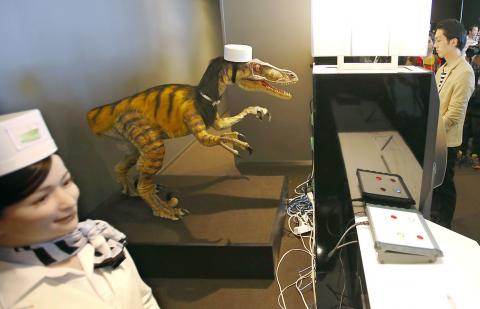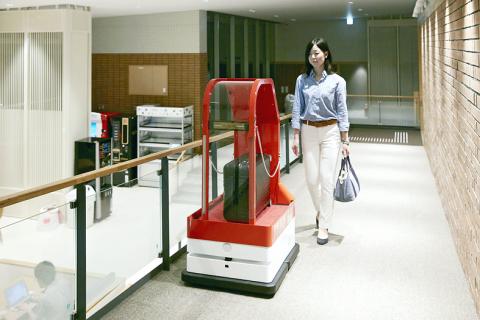The English-speaking receptionist is a vicious-looking dinosaur, and the one speaking Japanese is a female humanoid with blinking lashes.
“If you want to check in, push one,” the dinosaur says.
The visitor punches a button on the desk, and types in information on a touch panel screen.

Photo: AP
From the front desk to the porter, which is an automated trolley taking luggage up to the room, this hotel in southwestern Japan, aptly called Weird Hotel, is “manned” almost totally by robots to save labor costs.
Hideo Sawada, who runs the hotel as part of an amusement park, says using robots is not a gimmick, but a serious effort to utilize technology and achieve efficiency.
Henn-na Hotel, as it is called in Japanese, was shown to reporters on Wednesday, complete with robot demonstrations, ahead of its opening to the public on Friday.

Photo: EPA
Another feature of the hotel is the use of facial-recognition technology, instead of the standard electronic keys, by registering the digital image of the guest’s face during check-in.
The reason? Robots are not good at finding keys, if people happen to lose them.
A giant robotic arm, usually seen in manufacturing, is encased in glass quarters in the corner of the lobby. It lifts one of the boxes stacked into the wall and puts it out through a space in the glass, where a guest can place an item in it, to use as a locker.
The arm will put the box back into the wall, until the guest wants it again. The system is called “robot cloak room.”
Why a simple coin locker will not suffice is beside the point.
“I wanted to highlight innovation,” Sawada told reporters. “I also wanted to do something about hotel prices going up.”
Staying at Henn na Hotel starts at ¥9,000 (US$80), a bargain for Japan, where a stay in one of the nicer hotels can easily cost twice or three times that much.
The concierge is a doll-like hairless robot with voice recognition that prattles breakfast and event information. It cannot call a cab or do other errands.
Japan is a world leader in robotics technology, and the government is trumpeting robotics as a pillar of its growth strategy. Robots have long been used there in manufacturing. However, interest is also high in exploring the potential of robots in human interaction, including helping care for the elderly.
Robotics is also key in the decommissioning of the three reactors at the Fukushima Dai-ichi nuclear power plant, which went into meltdown in 2011, in the worst nuclear catastrophe since Chernobyl.
One area for which the Henn-na Hotel still relies on human beings is security.
The place is dotted with security cameras, and real people are watching everything through a monitor to make sure guests stay safe and no one makes off with one of the expensive robots.
“And they still can’t make beds,” said Sawada, who has also engineered the rise of a popular affordable Japanese travel agency.
He has big ambitions for his robot hotel concept and wants to open another one soon in Japan, and later abroad. He is also eager to add other languages, such as Chinese and Korean, to the robots’ vocabulary.
A block-shaped robot that was scuttling around in the lobby had been brought in to do room service, delivering beverages and simple snacks, but it was not ready to do that yet.
Outdoors, Sawada also demonstrated a drone that flew in to deliver a few small jars filled with snacks. He said he wanted to eventually have drones perform in shows for guests.
In the hotel’s rooms, a lamp-size robot in the shape of a fat pink tulip called Tuly answers simple questions like: “What time is it?” and “What is the weather tomorrow?”
You can also tell it to turn the room lights on or off. There are no switches on the walls.
Sawada is keeping the hotel half-filled for the first few weeks to make sure nothing goes wrong.
He also canceled at the last minute the overnight stay planned for media. The robots simply were not ready.

Intel Corp chief executive officer Lip-Bu Tan (陳立武) is expected to meet with Taiwanese suppliers next month in conjunction with the opening of the Computex Taipei trade show, supply chain sources said on Monday. The visit, the first for Tan to Taiwan since assuming his new post last month, would be aimed at enhancing Intel’s ties with suppliers in Taiwan as he attempts to help turn around the struggling US chipmaker, the sources said. Tan is to hold a banquet to celebrate Intel’s 40-year presence in Taiwan before Computex opens on May 20 and invite dozens of Taiwanese suppliers to exchange views

Application-specific integrated circuit designer Faraday Technology Corp (智原) yesterday said that although revenue this quarter would decline 30 percent from last quarter, it retained its full-year forecast of revenue growth of 100 percent. The company attributed the quarterly drop to a slowdown in customers’ production of chips using Faraday’s advanced packaging technology. The company is still confident about its revenue growth this year, given its strong “design-win” — or the projects it won to help customers design their chips, Faraday president Steve Wang (王國雍) told an online earnings conference. “The design-win this year is better than we expected. We believe we will win

Quanta Computer Inc (廣達) chairman Barry Lam (林百里) is expected to share his views about the artificial intelligence (AI) industry’s prospects during his speech at the company’s 37th anniversary ceremony, as AI servers have become a new growth engine for the equipment manufacturing service provider. Lam’s speech is much anticipated, as Quanta has risen as one of the world’s major AI server suppliers. The company reported a 30 percent year-on-year growth in consolidated revenue to NT$1.41 trillion (US$43.35 billion) last year, thanks to fast-growing demand for servers, especially those with AI capabilities. The company told investors in November last year that

Power supply and electronic components maker Delta Electronics Inc (台達電) yesterday said it plans to ship its new 1 megawatt charging systems for electric trucks and buses in the first half of next year at the earliest. The new charging piles, which deliver up to 1 megawatt of charging power, are designed for heavy-duty electric vehicles, and support a maximum current of 1,500 amperes and output of 1,250 volts, Delta said in a news release. “If everything goes smoothly, we could begin shipping those new charging systems as early as in the first half of next year,” a company official said. The new